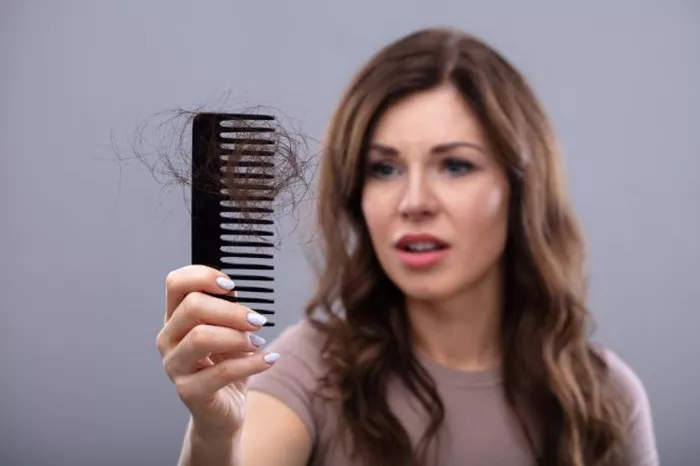Hair loss is a common concern that affects millions of people worldwide, regardless of age or gender. If you’ve noticed an unusual amount of hair falling out, you may be wondering what’s causing it and whether it’s a temporary issue or a sign of something more serious. The truth is, hair loss can stem from a variety of factors, ranging from nutritional deficiencies to underlying medical conditions. Understanding the root cause is essential in determining the right course of action to restore hair health.
The Natural Hair Growth Cycle
Before diving into the reasons behind excessive hair loss, it’s important to understand how hair grows. Hair goes through a continuous cycle consisting of three main phases:
Anagen (Growth Phase): This is the active phase where hair follicles produce new hair. It can last anywhere from two to seven years, depending on genetics.
Catagen (Transition Phase): A short phase lasting about two weeks, where hair growth slows down, and the follicle shrinks.
Telogen (Resting Phase): Hair doesn’t grow during this phase but remains in the follicle. After about three months, the hair sheds, and new hair begins to grow in its place.
On average, a person loses between 50 to 100 hairs per day as part of this natural cycle. However, when hair shedding exceeds this amount, it could indicate an underlying issue.
Common Causes of Excessive Hair Loss
Several factors can disrupt the hair growth cycle, leading to increased shedding or thinning. Some of the most common causes include:
Hormonal Imbalances
Hormones play a crucial role in regulating hair growth. Conditions such as:
Androgenetic Alopecia (Male/Female Pattern Baldness): This hereditary condition is linked to dihydrotestosterone (DHT), a hormone that shrinks hair follicles over time.
Thyroid Disorders: Both hypothyroidism (underactive thyroid) and hyperthyroidism (overactive thyroid) can lead to hair thinning.
Postpartum Hair Loss: Many women experience significant shedding a few months after childbirth due to hormonal fluctuations.
Nutritional Deficiencies
A lack of essential vitamins and minerals can weaken hair follicles, leading to excessive shedding. Key nutrients for hair health include:
- Iron: Deficiency is a common cause of hair loss, especially in women.
- Vitamin D: Low levels have been linked to alopecia areata and general thinning.
- Biotin (Vitamin B7): While rare, a deficiency in biotin can lead to brittle hair and increased shedding.
- Zinc and Protein: Both are vital for hair structure and growth.
Stress and Physical Trauma
Physical or emotional stress can push hair follicles into the telogen phase prematurely, leading to a condition called telogen effluvium. Common triggers include:
- Major surgery or illness
- Severe emotional distress
- Rapid weight loss or extreme dieting
- High fever or infections
Medical Conditions and Medications
Certain health issues and treatments can contribute to hair loss, such as:
- Autoimmune Diseases: Conditions like alopecia areata cause the immune system to attack hair follicles.
- Scalp Infections: Fungal infections like tinea capitis can lead to patchy hair loss.
- Medications: Drugs used for cancer (chemotherapy), blood pressure, depression, and hormonal treatments often list hair loss as a side effect.
Hair Care Practices
Sometimes, the way we treat our hair can contribute to damage and breakage. Overuse of:
- Heat styling tools (flat irons, curling wands)
- Harsh chemical treatments (bleaching, perms, relaxers)
- Tight hairstyles (braids, ponytails, extensions) that pull on the roots
Diagnosing the Cause of Hair Loss
If you’re experiencing significant hair loss, consulting a dermatologist or trichologist (hair specialist) is crucial. They may perform:
- Blood Tests: To check for thyroid issues, iron levels, or vitamin deficiencies.
- Scalp Biopsy: A small sample of the scalp is examined to detect infections or scarring alopecia.
- Pull Test: Gently tugging on hair to see how many strands come out, indicating active shedding.
- Dermoscopy: A magnified examination of the scalp to assess follicle health.
Treatment and Prevention Strategies
The right treatment depends on the underlying cause. Some effective approaches include:
Medical Treatments
- Minoxidil (Rogaine): An over-the-counter topical treatment that stimulates hair growth.
- Finasteride (Propecia): A prescription pill for men that blocks DHT, slowing hair loss.
- Hormone Therapy: For women with PCOS or menopause-related hair thinning.
- Steroid Injections: Used for alopecia areata to reduce inflammation.
Nutritional Adjustments
Eating a balanced diet rich in:
- Lean proteins (chicken, fish, beans)
- Iron-rich foods (spinach, red meat, lentils)
- Omega-3 fatty acids (salmon, walnuts, flaxseeds)
Supplements may be recommended if deficiencies are detected.
Lifestyle Changes
- Stress Management: Meditation, yoga, or therapy can help reduce stress-induced shedding.
- Gentle Hair Care: Avoiding excessive heat, tight hairstyles, and harsh chemicals.
- Scalp Care: Using mild shampoos and massaging the scalp to improve circulation.
Advanced Treatments
For more severe cases, options like:
- Platelet-Rich Plasma (PRP) Therapy: Injecting concentrated platelets to stimulate growth.
- Hair Transplant Surgery: Moving hair follicles from dense areas to thinning spots.
When to Seek Professional Help
While some hair loss is normal, you should see a doctor if:
- You notice sudden or patchy hair loss.
- Your scalp is itchy, red, or scaling.
- You’re losing hair in clumps or seeing bald spots.
- Hair loss is accompanied by fatigue, weight changes, or other symptoms.
Conclusion
Experiencing excessive hair loss can be distressing, but in many cases, it’s reversible with the right approach. Identifying the root cause—whether hormonal, nutritional, or stress-related—is the first step toward effective treatment. By adopting healthier hair care habits, improving your diet, and seeking medical advice when needed, you can promote regrowth and maintain fuller, stronger hair. Remember, early intervention often leads to better outcomes, so don’t hesitate to consult a specialist if you’re concerned about your hair health.
Related Topics:
- Why Is My Hair Falling Out After Surgery?
- What Is the Connection Between Greasy Hair and Hair Loss?
- Why Is My Healthy Hair Falling Out?


